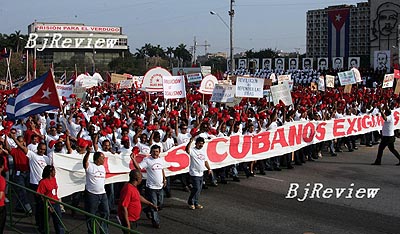|

The weeklong general debate of the 62nd Session of the UN General Assembly started on September 25 at UN headquarters in New York. "In Cuba, the long rule of a cruel dictator is nearing its end," said U.S. President George W. Bush, when addressing the General Assembly that day. "The Cuban people are ready for their freedom." Then the Cuban delegation stormed out of the meeting in protest of Bush's offensive remarks.
Cuban Foreign Minister Felipe Pérez Roque said the next day that Bush had "no moral authority or credibility to judge anyone," while calling the U.S. president's remarks "delirium tremens of the world's policeman." His speech won approval from his counterparts from a number of other countries.
The verbal attacks were a strong testament to the enmity between the United States and Cuba. But the two countries' hostile relations are far broader than bitter exchanges between officials.
From trade embargo to missile crisis
The United States recognized Cuba's interim government shortly after the country won its revolution in 1959. In April the same year, Cuban President Fidel Castro paid a private visit to the United States, during which he discussed Cuba-U.S. relations and other issues with U.S. Vice President Richard Nixon.
Cuba began to carry out agrarian reforms in May 1959. According to the laws enacted by the Cuban Government, large pieces of U.S.-owned land in Cuba were to be expropriated. The United States would not accept the compensation Cuba offered, and Cuba refused to make any concessions. This was the first confrontation between the two countries after the Cuban Revolution.
The United States stopped all of its economic assistance to Cuba in May 1960. Five months later, it established a trade embargo on Cuba. These moves, of course, met with objections and protests from Cuba. The United States broke diplomatic relations with Cuba on January 3, 1961.
After President John F. Kennedy took office on January 20 in the same year, the United States beefed up its plan to launch a military invasion of Cuba. On April 15, U.S. bombers from pro-U.S. Nicaragua blasted several airports in Cuba. The next day, at a mass rally to protest U.S. imperialism, Castro declared that the Cuban Revolution was a socialist revolution. A 1,500-member mercenary army trained in the United States invaded Cuba from the Bay of Pigs on April 17, attempting to topple the Cuban Government by force. After three days of fighting, Cuba defeated the invaders. Castro announced that Cuba was a socialist country on May 1. In December, he declared himself a Marxist-Leninist.
The United States imposed a comprehensive economic blockade on Cuba in February 1962. In July, the Soviet Union shipped missiles to Cuba, which were detected by the United States. President Kennedy announced a military blockade on Cuba and demanded that the Soviet Union withdraw the offensive weapons it had deployed in Cuba. The "Caribbean missile crisis" ended with a Soviet defeat on January 7, 1963. The relations between the United States and Cuba further deteriorated.
Discussions on who lost Cuba gained currency in U.S. academia in the wake of the missile crisis. One camp believed that the United States was responsible for the deterioration of the U.S.-Cuba relations, because Cuba had to turn to the Soviet Union in light of the Americans' failure to maintain good relations with the Castro government. Others argued that the United States should take tough measures to prevent Cuba, a socialist country in the backyard of the United States, from expanding the influence of communism in the Western Hemisphere.
Persistent sanctions
Signs of relaxation emerged during the administrations of Gerald Ford and Jimmy Carter in the mid- and late 1970s. For example, in March 1977 the Carter administration canceled the ban that prohibited Americans from traveling to Cuba. The two countries established interest sections in each other's capitals on September 1. In October, Cuba's foreign trade minister visited the United States at the invitation of dozens of U.S. companies. Despite these measures, Washington's hostile policy toward Cuba remained unchanged.
After President Ronald Reagan assumed office, the United States tightened its embargo on Cuba. On May 20, 1985, Radio Martí, which was under the patronage of the then U.S. Information Agency, started to broadcast from the United States to Cuba. The broadcast was designed to arouse the discontent of the Cubans and attack the Cuban Government.
The Cuban Government reacted strongly by issuing a statement denouncing the "brazen provocative act" of the United States the day the radio station began operating. It also stopped the implementation of the two countries' agreement on immigration. In October, Reagan announced that incumbent Cuban officials were not allowed to enter the United States. The U.S. Government imposed even harsher economic sanctions on Cuba in August 1986. At the end of the 1980s, despite Cuba's withdrawal of its troops from Africa, the United States continued its hardline policy toward Cuba.
As the Cold War came to an end, dramatic changes took place in the international situation in the 1990s. With assistance from the Soviet Union and its Eastern European satellite countries no longer available, Cuba faced unprecedented economic difficulties. In his bid to canvass votes for a second term, President George H. W. Bush signed the Cuban Democracy Act, also known as the Torricelli Law, in October 1992 in Miami, an American city with a large Cuban exile
| 